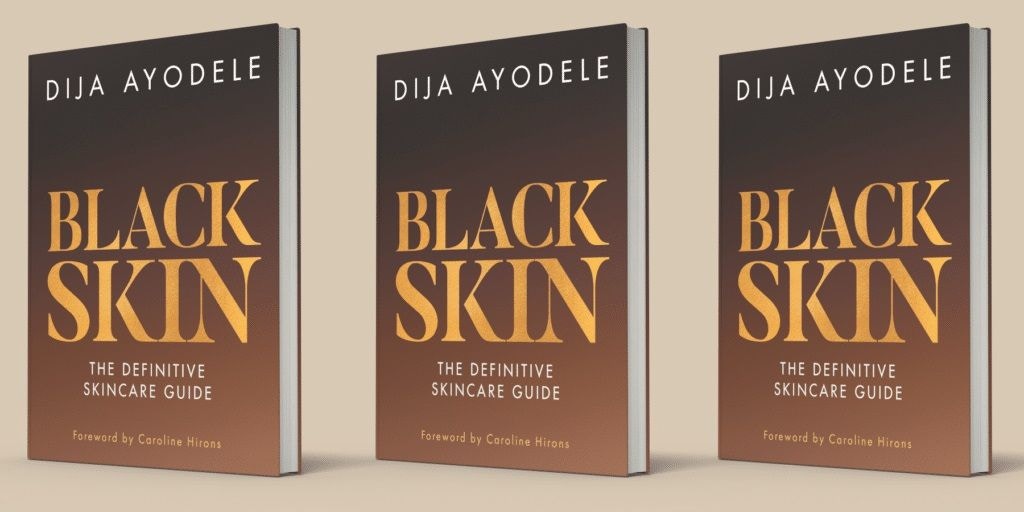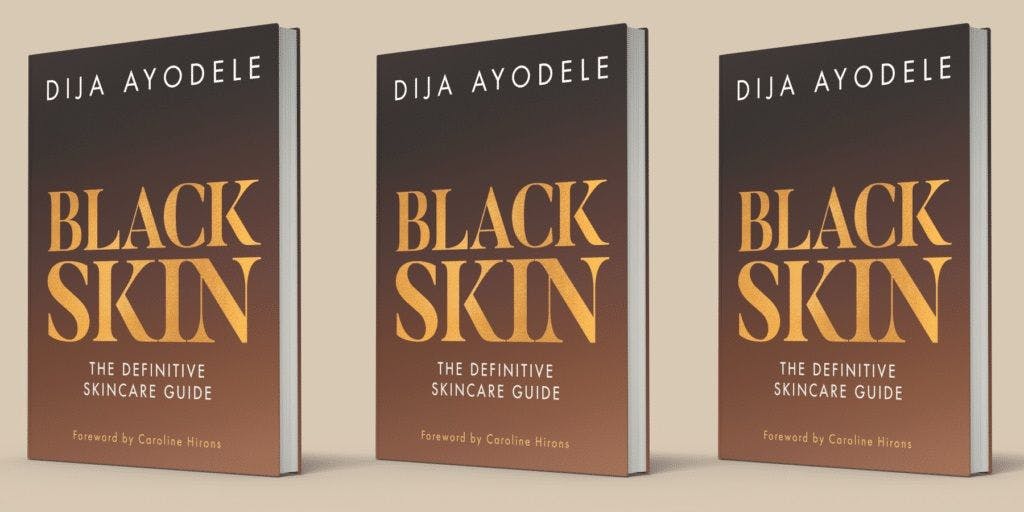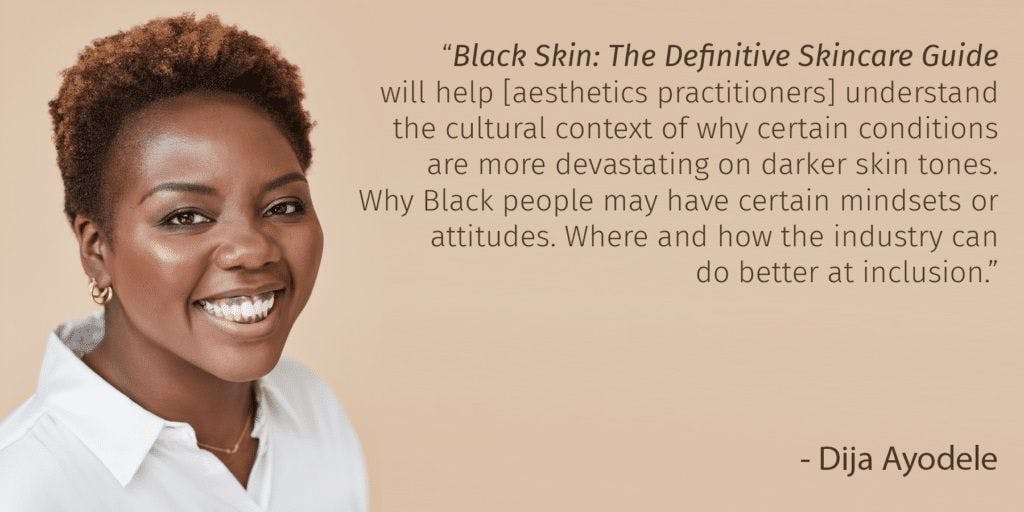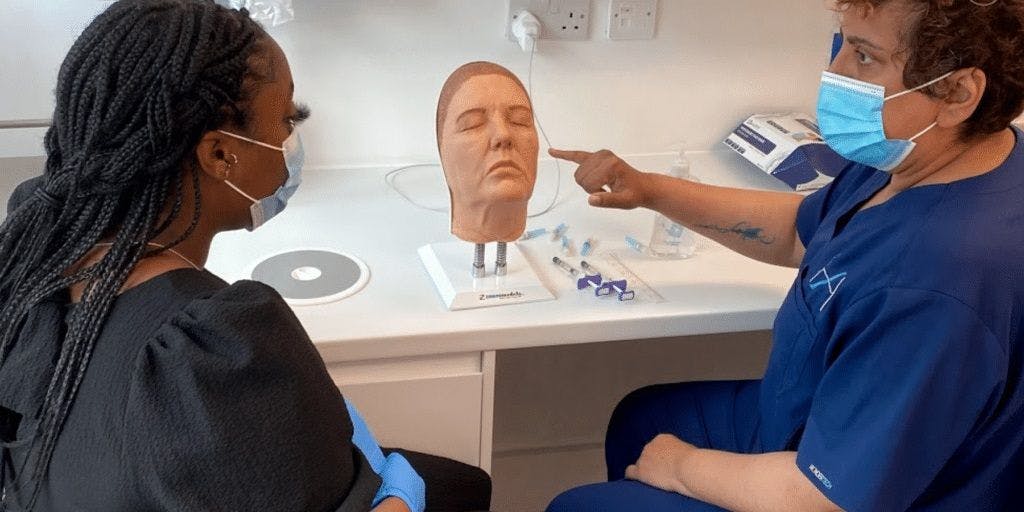Why Every Injector Needs To Understand Black Skin

To be an effective aesthetic practitioner, every injector needs to understand Black skin. While this may seem an obvious statement, skin of colour – particularly darker Black skin tones – is routinely omitted from textbooks and marketing in our industry.
As Maja Swierczynska, Harley Academy cosmetic dermatology trainer and lead aesthetician at STORY Marylebone, notes, “There are not a lot of practitioners who have knowledge of how to treat skin of colour. It is simply not something that is available in beauty college or covered during the basics of dermatology.
“We need to make sure we are fully educated and know the differences between skin types and types of melanin. Skin of colour needs to be treated with extra care as it’s more prone to post-procedure complications and it’s crucial for practitioners to be as aware of and comfortable treating Black skin as they are paler complexions. This will let us provide an effective service for all clients.”

Black Skin: The Definitive Skincare Guide
At present there is a knowledge gap for both patients and practitioners as to how skin treatments and, especially, aesthetic medicine can benefit people of colour. So, to ensure you are a capable, knowledgeable and inclusive injector, you need to understand how to treat every skin tone.
In order to really understand the unique care Black skin requires, and to better understand the mindset of injectable patients of colour, we recommend every aesthetic practitioner – especially those following our “skin first” ethos – read Black Skin: The Definitive Skincare Guide by Dija Ayodele.
Skin health expert, business owner, educator and author, Dija Ayodele is a force to be reckoned with. In addition to running her own London skin clinic, West Room Aesthetics – which specialises in optimising skin of colour – Ayodele has a long and impressive list of industry credentials.
She founded the Black Skin Directory in 2018 to connect people of colour to appropriate practitioners. Her role as an educator, speaker and commentator on diversity has seen her lead panels for renowned institutions including the House of Commons, the British Association of Dermatologists and Brown University. She sits on the boards of the British Association of Beauty Therapy & Cosmetology (BABTAC) and the British Beauty Council. Additionally, she is a trustee of the Beauty Backed charity, is a regular columnist for Glamour magazine and, now, author. Phew.
We spoke to Dija Ayodele about her hotly anticipated book to find out what aesthetic medicine and cosmetic dermatology students can learn from it.

Interview with Dija Ayodele
How can Black Skin fill knowledge gaps for cosmetic dermatologists?
“Black Skin: The Definitive Skincare Guide will provide a historical underpinning and context that enable practitioners to understand their patients better. There are some fascinating insights into how racism has intersected with the beauty industry and how this has impacted Black women. It will give an insight into why Black women have been left out of aesthetic conversations and help them see how they can be more inclusive to change the narrative.”
How can your book help aesthetic medicine practitioners?
“Aesthetic professionals already have the practical knowledge in managing skin conditions, but Black Skin will help them understand the cultural context of why certain conditions are more devastating on darker skin tones. Why Black people may have certain mindsets or attitudes. Where and how the industry can do better at inclusion.”
“I unapologetically pursue excellence, and every day I am inspired to revolutionise how women of colour access the beauty and skincare world, in a way that makes them feel seen and valued.” – DIJA AYODELE
Besides reading your book, ensuring patients of colour, especially those with dark skin tones, see themselves reflected in their marketing and gaining hands-on experience of treating these patients, what do you believe is the most important unique factor professionals need to understand about treating Black patients?
“I think cultural and historical context is important. I think it’s what helps a practitioner provide a more understanding and empathic service, it helps them frame conversations in ways their patient will understand and ways in which their Black patients will feel more comfortable and confident in their abilities.”
Why do you think Black patients are the least likely to agree to having their before and after images shared for marketing purposes?
“For a large part culturally, injectables just aren’t the done thing and it’s certainly not something you want publicised. There is a fear of judgement, for a long time injectables was seen as something white women did. Throughout history, as you’ll read in my book, approximation to whiteness was something that Black people were taught to aspire towards to be successful in life. So, therefore, participating in a practice associated with white women would be seen as succumbing to that narrative even in 2021.”
What do you think about the stigma of injectables within the Black community? Is it becoming less of a thing and how can practitioners help to fight this?
“The stigma comes from not knowing enough about it, therefore the lack of knowledge bars participation. After not being included in the conversation for so long, it’s no surprise that there is scepticism about injectables. Though I do think with the millennial market this is less of an issue; there is more willingness to experiment and there is a crop of amazing young Black aesthetic doctors who are flying the flag to make injectables more accessible and break down barriers.”
“I think overall practitioners need to be more nuanced in their approach with injectables to ensure everyone is carried along. Generic conversations that favour white patients will make Black women sign out. For example, lip fillers aren’t just to enlarge the lips – a lot of Black women don’t want that. However, the conversation could be more around providing definition and shape, hydration benefits. Finding ways to include all patients in the conversation is key so everyone benefits.

Becoming an aesthetics specialist
As Dija and Maja have both explained, we cannot stress enough the importance of being able to treat all skin tones. This involves learning the idiosyncrasies involved with each and letting this knowledge inform your patient approach and treatment.
You cannot consider yourself an aesthetics specialist if you can only treat one type of patient – for example, those with white skin. This also applies to age and gender.
We encourage students taking our Level 7 Diploma in Botox and Dermal Fillers to treat a wide range of patients during their mentoring. This way you can witness and become familiar with common concerns and the best solutions for specific patient groups.
You should strive to treat as broad a range of skin tones, ages and genders as possible, whilst you are training. This will allow you to be guided by your mentor and ask any questions you may have, so you are prepared and able to welcome all patients to your practice once you are ready to inject solo.
Black Skin: The Definitive Skincare Guide by Dija Ayodele is published by HQ Stories and Harper Collins and is available to order now.
All information correct at the time of publication
Download our full prospectus
Browse all our injectables, dermal fillers and cosmetic dermatology courses in one document
By submitting this form, you agree to receive marketing about our products, events, promotions and exclusive content. Consent is not a condition of purchase, and no purchase is necessary. Message frequency varies. View our Privacy Policy and Terms & Conditions
Attend our FREE open evening
If you're not sure which course is right for you, let us help
Join us online or in-person at our free open evening to learn more
Our Partners













STAY INFORMED
Sign up to receive industry news, careers advice, special offers and information on Harley Academy courses and services

